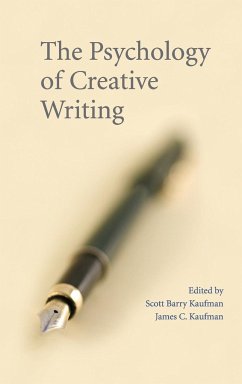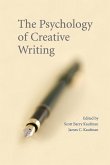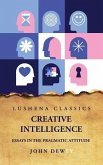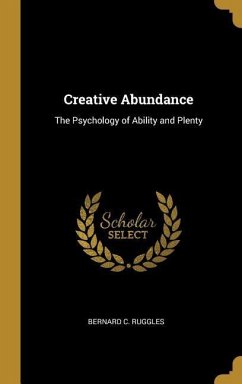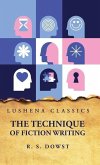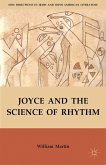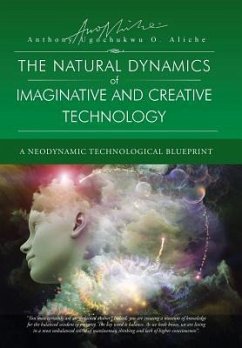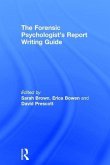- Gebundenes Buch
- Merkliste
- Auf die Merkliste
- Bewerten Bewerten
- Teilen
- Produkt teilen
- Produkterinnerung
- Produkterinnerung
The Psychology of Creative Writing takes a scholarly, psychological look at multiple aspects of creative writing.
Andere Kunden interessierten sich auch für
![The Psychology of Creative Writing The Psychology of Creative Writing]() Scott Barry KaufmanThe Psychology of Creative Writing62,99 €
Scott Barry KaufmanThe Psychology of Creative Writing62,99 €![Creative Intelligence Essays in the Pragmatic Attitude Creative Intelligence Essays in the Pragmatic Attitude]() John DeweyCreative Intelligence Essays in the Pragmatic Attitude54,99 €
John DeweyCreative Intelligence Essays in the Pragmatic Attitude54,99 €![Creative Abundance: The Psychology of Ability and Plenty Creative Abundance: The Psychology of Ability and Plenty]() Bernard C. RugglesCreative Abundance: The Psychology of Ability and Plenty33,99 €
Bernard C. RugglesCreative Abundance: The Psychology of Ability and Plenty33,99 €![The Technique of Fiction Writing The Technique of Fiction Writing]() Robert Saunders DowstThe Technique of Fiction Writing37,99 €
Robert Saunders DowstThe Technique of Fiction Writing37,99 €![Joyce and the Science of Rhythm Joyce and the Science of Rhythm]() W. MartinJoyce and the Science of Rhythm61,99 €
W. MartinJoyce and the Science of Rhythm61,99 €![The Natural Dynamic of Imaginative and Creative Technology The Natural Dynamic of Imaginative and Creative Technology]() Anthony Ugochukwu O AlicheThe Natural Dynamic of Imaginative and Creative Technology34,99 €
Anthony Ugochukwu O AlicheThe Natural Dynamic of Imaginative and Creative Technology34,99 €![The Forensic Psychologist's Report Writing Guide The Forensic Psychologist's Report Writing Guide]() The Forensic Psychologist's Report Writing Guide217,99 €
The Forensic Psychologist's Report Writing Guide217,99 €-
-
-
The Psychology of Creative Writing takes a scholarly, psychological look at multiple aspects of creative writing.
Hinweis: Dieser Artikel kann nur an eine deutsche Lieferadresse ausgeliefert werden.
Hinweis: Dieser Artikel kann nur an eine deutsche Lieferadresse ausgeliefert werden.
Produktdetails
- Produktdetails
- Verlag: Cambridge University Press
- Seitenzahl: 408
- Erscheinungstermin: 3. September 2009
- Englisch
- Abmessung: 235mm x 157mm x 28mm
- Gewicht: 810g
- ISBN-13: 9780521881647
- ISBN-10: 0521881641
- Artikelnr.: 26222199
- Herstellerkennzeichnung
- Libri GmbH
- Europaallee 1
- 36244 Bad Hersfeld
- gpsr@libri.de
- Verlag: Cambridge University Press
- Seitenzahl: 408
- Erscheinungstermin: 3. September 2009
- Englisch
- Abmessung: 235mm x 157mm x 28mm
- Gewicht: 810g
- ISBN-13: 9780521881647
- ISBN-10: 0521881641
- Artikelnr.: 26222199
- Herstellerkennzeichnung
- Libri GmbH
- Europaallee 1
- 36244 Bad Hersfeld
- gpsr@libri.de
Part I. The Writer: 1. The Personalities of Creative Writers Jane Piirto;
2. Killing Your Babies: The Creative Writer, Locus of Control, and
Rumination E. M. Skrzynecky and James C. Kaufman; 3. 'The more I write, the
better I write, and the better I feel about myself': Mood Variability and
Mood Regulation in Student Journalists and Creative Writers Adèle Kohanyi;
4. Characteristics of Eminent Screenwriters: Who Are Those Guys? Steven R.
Pritzker and David McGarva; 5. The Tears of a Clown: Understanding Comedy
Writers Scott Barry Kaufman and Aaron Kozbelt; Part II. The Text: 6. The
Evolution of Creative Writing Daniel Nettle; 7. Literary Creativity and
Physiognomy: Expressiveness in Writers, Readers, and Literature Martin S.
Lindauer; 8. The Literary Genius of William Shakespeare: Empirical Studies
of His Dramatic and Poetic Creativity Dean Keith Simonton; Part III. The
Process: 9. In search of the writer's creative process Todd Lubart; 10.
Writing as a collaborative act R. Keith Sawyer; 11. Writing as an
interaction with ideas Mark A. Runco; 12. Creative Cognition in Science
Fiction and Fantasy Writing Thomas B. Ward and E. Thomas Lawson; Part IV.
The Development: 13. Writing in flow Susan K. Perry; 14. Writers' Blocks
and Blocked Writers: Using Natural Imagery to Enhance Creativity Jerome L.
Singer and Michael V. Barrios; 15. Pretend Play, Emotional Processes, and
Developing Narratives Sandra W. Russ; 16. The Healing Powers of Expressive
Writing Janel D. Sexton and James W. Pennebaker; Part V. The Education: 17.
How Rewards and Evaluations Can Undermine Creativity (and How to Prevent
This) John Baer and Sharon S. McKool; 18. Teaching Writing by
Demythologizing Creativity Grace R. Waitman and Jonathan A. Plucker; 19.
Creation and Response: Wellspring to Evaluation Genevieve E. Chandler and
Pat Schneider; 20. Fostering Creative Writing: Challenges Faced by Chinese
Learners Ai-Girl Tan; 21. Putting the Parts Together: An Integrative Look
at the Psychology of Creative Writing Scott Barry Kaufman and James C.
Kaufman.
2. Killing Your Babies: The Creative Writer, Locus of Control, and
Rumination E. M. Skrzynecky and James C. Kaufman; 3. 'The more I write, the
better I write, and the better I feel about myself': Mood Variability and
Mood Regulation in Student Journalists and Creative Writers Adèle Kohanyi;
4. Characteristics of Eminent Screenwriters: Who Are Those Guys? Steven R.
Pritzker and David McGarva; 5. The Tears of a Clown: Understanding Comedy
Writers Scott Barry Kaufman and Aaron Kozbelt; Part II. The Text: 6. The
Evolution of Creative Writing Daniel Nettle; 7. Literary Creativity and
Physiognomy: Expressiveness in Writers, Readers, and Literature Martin S.
Lindauer; 8. The Literary Genius of William Shakespeare: Empirical Studies
of His Dramatic and Poetic Creativity Dean Keith Simonton; Part III. The
Process: 9. In search of the writer's creative process Todd Lubart; 10.
Writing as a collaborative act R. Keith Sawyer; 11. Writing as an
interaction with ideas Mark A. Runco; 12. Creative Cognition in Science
Fiction and Fantasy Writing Thomas B. Ward and E. Thomas Lawson; Part IV.
The Development: 13. Writing in flow Susan K. Perry; 14. Writers' Blocks
and Blocked Writers: Using Natural Imagery to Enhance Creativity Jerome L.
Singer and Michael V. Barrios; 15. Pretend Play, Emotional Processes, and
Developing Narratives Sandra W. Russ; 16. The Healing Powers of Expressive
Writing Janel D. Sexton and James W. Pennebaker; Part V. The Education: 17.
How Rewards and Evaluations Can Undermine Creativity (and How to Prevent
This) John Baer and Sharon S. McKool; 18. Teaching Writing by
Demythologizing Creativity Grace R. Waitman and Jonathan A. Plucker; 19.
Creation and Response: Wellspring to Evaluation Genevieve E. Chandler and
Pat Schneider; 20. Fostering Creative Writing: Challenges Faced by Chinese
Learners Ai-Girl Tan; 21. Putting the Parts Together: An Integrative Look
at the Psychology of Creative Writing Scott Barry Kaufman and James C.
Kaufman.
Part I. The Writer: 1. The Personalities of Creative Writers Jane Piirto;
2. Killing Your Babies: The Creative Writer, Locus of Control, and
Rumination E. M. Skrzynecky and James C. Kaufman; 3. 'The more I write, the
better I write, and the better I feel about myself': Mood Variability and
Mood Regulation in Student Journalists and Creative Writers Adèle Kohanyi;
4. Characteristics of Eminent Screenwriters: Who Are Those Guys? Steven R.
Pritzker and David McGarva; 5. The Tears of a Clown: Understanding Comedy
Writers Scott Barry Kaufman and Aaron Kozbelt; Part II. The Text: 6. The
Evolution of Creative Writing Daniel Nettle; 7. Literary Creativity and
Physiognomy: Expressiveness in Writers, Readers, and Literature Martin S.
Lindauer; 8. The Literary Genius of William Shakespeare: Empirical Studies
of His Dramatic and Poetic Creativity Dean Keith Simonton; Part III. The
Process: 9. In search of the writer's creative process Todd Lubart; 10.
Writing as a collaborative act R. Keith Sawyer; 11. Writing as an
interaction with ideas Mark A. Runco; 12. Creative Cognition in Science
Fiction and Fantasy Writing Thomas B. Ward and E. Thomas Lawson; Part IV.
The Development: 13. Writing in flow Susan K. Perry; 14. Writers' Blocks
and Blocked Writers: Using Natural Imagery to Enhance Creativity Jerome L.
Singer and Michael V. Barrios; 15. Pretend Play, Emotional Processes, and
Developing Narratives Sandra W. Russ; 16. The Healing Powers of Expressive
Writing Janel D. Sexton and James W. Pennebaker; Part V. The Education: 17.
How Rewards and Evaluations Can Undermine Creativity (and How to Prevent
This) John Baer and Sharon S. McKool; 18. Teaching Writing by
Demythologizing Creativity Grace R. Waitman and Jonathan A. Plucker; 19.
Creation and Response: Wellspring to Evaluation Genevieve E. Chandler and
Pat Schneider; 20. Fostering Creative Writing: Challenges Faced by Chinese
Learners Ai-Girl Tan; 21. Putting the Parts Together: An Integrative Look
at the Psychology of Creative Writing Scott Barry Kaufman and James C.
Kaufman.
2. Killing Your Babies: The Creative Writer, Locus of Control, and
Rumination E. M. Skrzynecky and James C. Kaufman; 3. 'The more I write, the
better I write, and the better I feel about myself': Mood Variability and
Mood Regulation in Student Journalists and Creative Writers Adèle Kohanyi;
4. Characteristics of Eminent Screenwriters: Who Are Those Guys? Steven R.
Pritzker and David McGarva; 5. The Tears of a Clown: Understanding Comedy
Writers Scott Barry Kaufman and Aaron Kozbelt; Part II. The Text: 6. The
Evolution of Creative Writing Daniel Nettle; 7. Literary Creativity and
Physiognomy: Expressiveness in Writers, Readers, and Literature Martin S.
Lindauer; 8. The Literary Genius of William Shakespeare: Empirical Studies
of His Dramatic and Poetic Creativity Dean Keith Simonton; Part III. The
Process: 9. In search of the writer's creative process Todd Lubart; 10.
Writing as a collaborative act R. Keith Sawyer; 11. Writing as an
interaction with ideas Mark A. Runco; 12. Creative Cognition in Science
Fiction and Fantasy Writing Thomas B. Ward and E. Thomas Lawson; Part IV.
The Development: 13. Writing in flow Susan K. Perry; 14. Writers' Blocks
and Blocked Writers: Using Natural Imagery to Enhance Creativity Jerome L.
Singer and Michael V. Barrios; 15. Pretend Play, Emotional Processes, and
Developing Narratives Sandra W. Russ; 16. The Healing Powers of Expressive
Writing Janel D. Sexton and James W. Pennebaker; Part V. The Education: 17.
How Rewards and Evaluations Can Undermine Creativity (and How to Prevent
This) John Baer and Sharon S. McKool; 18. Teaching Writing by
Demythologizing Creativity Grace R. Waitman and Jonathan A. Plucker; 19.
Creation and Response: Wellspring to Evaluation Genevieve E. Chandler and
Pat Schneider; 20. Fostering Creative Writing: Challenges Faced by Chinese
Learners Ai-Girl Tan; 21. Putting the Parts Together: An Integrative Look
at the Psychology of Creative Writing Scott Barry Kaufman and James C.
Kaufman.

